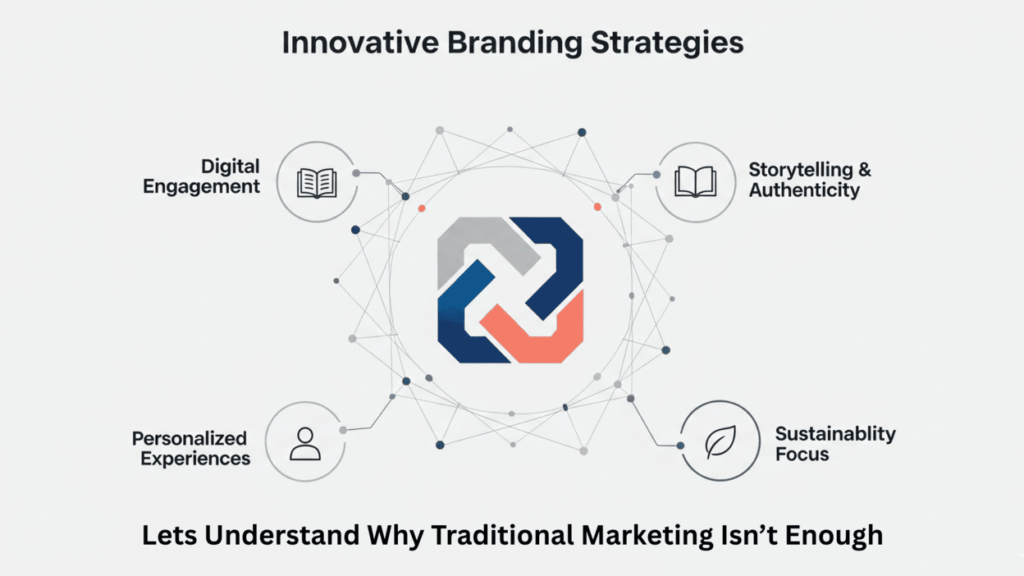Why Traditional Marketing Isn’t Enough: Innovative Branding Strategies for Modern Businesses

In today’s rapidly evolving marketing landscape, traditional marketing strategies are increasingly failing to resonate with modern consumers. This article highlights the inadequacies of traditional marketing methods and emphasizes the need for innovative branding strategies that engage audiences in meaningful ways. Readers will discover why traditional marketing strategies are losing their effectiveness, innovative branding approaches championed by top brand strategy agencies, and practical ways to revamp their brand strategy to align with contemporary consumer expectations.
Understanding the Shift in Marketing Landscapes
Marketing is no longer just about broadcasting a brand message via traditional media outlets. As internet usage proliferates and digital communication channels gain prominence, brands find themselves facing the challenge of capturing the attention of increasingly discerning consumers. This article will delve into the growing disconnect between traditional marketing and consumers’ expectations, spotlighting innovative branding strategies that provide a better foothold in today’s dynamic market.
Why Traditional Marketing Falls Short in Today’s Digital Age
Traditional marketing relies heavily on techniques such as television ads, radio spots, and print advertisements. However, with the rise of digital media, these methods have started to show diminishing returns. According to a 2022 report from the American Marketing Association, the effectiveness of television advertising has decreased by 20% compared to just five years prior. This decline can be attributed to the rise in ad-blocking technologies and consumer aversion to interruptions in their digital experiences.
Moreover, people’s media consumption habits have shifted dramatically; a significant portion now seeks information and entertainment primarily via online platforms. A study by Nielsen indicates that Americans spend over 11 hours a day using digital media, outperforming traditional formats significantly. This transition necessitates brands to move from traditional marketing to embrace innovative branding strategies to resonate with this new-age consumer.
The Shift in Consumer Preferences
As technology enables consumers to have instant access to information and connect with brands at all hours, their expectations have evolved. Today’s consumers seek more tailored and authentic experiences and meaningful connections with the brands they support. Unlike previous generations, they favor brands that offer transparency, personalization, and social responsibility.
This shift has reinforced the necessity for brands to invest in understanding their target audiences deeply. Brands that ignore this trend risk alienation from consumers who not only seek products but also value brand stories, visions, and ethics, thereby making it essential for businesses to adopt innovative branding strategies that engage and encourage loyalty.
What Are Innovative Branding Strategies?
Innovative branding strategies encompass a range of modern approaches that prioritize creativity, consumer engagement, and technological integration. These strategies revolve around understanding the unique selling propositions of brands while establishing emotional connections that resonate with individual consumers. A vital characteristic of modern branding is the ongoing conversation between consumers and brands, where feedback and interaction shape the brand experience.
Furthermore, innovative branding strategies are marked by original thinking and creativity, enabling brands to stand out in a crowded market. Companies focused on these strategies often leverage storytelling, personalization, social media engagement, and technology as platforms to enhance their brand image and connection with their consumers.
How Top Brand Strategy Agencies Lead the Way
Top brand strategy agencies play a crucial role in helping businesses transition from traditional marketing methods to innovative branding. These agencies specialize in identifying market trends, consumer insights, and opportunities for brand evolution. They assist companies in redefining their brand identity and narrative in a way that resonates with current consumer values and expectations. For example, Nike’s “Dream Crazy” campaign effectively showcased the power of storytelling, using the plight of athletes from diverse backgrounds to connect with their audience on a personal level.
Additionally, collaboration with top branding agencies has helped brands like Airbnb revamp their identities to create community-driven experiences. Through innovative strategies and expert guidance, brands can shift from traditional to modern branding effectively, generating strong consumer connections along the way.
Key Elements of Modern Branding Strategies
Storytelling as a Branding Technique
One of the most powerful elements of modern branding strategies is storytelling. Well-crafted narratives evoke emotions that resonate with consumers, creating lasting brand memories. Brands like Coca-Cola harness the power of storytelling to market their products during the holidays. Their “Share a Coke” campaign was not just about the drink itself; it focused on personal connections, sharing joy between family and friends.
Effective storytelling allows brands to craft experiences rather than just mere products, fostering consumer loyalty. By sharing authentic stories, brands can draw customers closer, translating into engagement and trust, which are invaluable in today’s market. Companies should aim to embrace this powerful tool to elevate their branding efforts.
Personalization and Consumer Engagement
In an era where consumers expect personalized experiences, brands must leverage data analytics to tailor their marketing messages. Personalization enhances relevance, enabling brands to reach consumers on a more intimate level. Businesses that invest in understanding their audience’s preferences and behaviors are likely to drive better engagement and conversion rates.
Brands like Amazon showcase personalization at its finest, providing tailored product recommendations based on user behavior. This strategy increases engagement and ensures that consumers feel valued and understood, thereby fostering brand loyalty.
The Role of Social Media and Influencer Marketing
Social media has transformed the way brands communicate with consumers. With platforms like Instagram, Twitter, and TikTok at their disposal, brands can engage users in real-time and create impactful marketing campaigns that reach wide audiences. Brands leveraging influencer marketing successfully harness the power of trusted voices to increase their brand visibility and credibility.
For instance, successful collaborations, such as those between Fenty Beauty and various beauty influencers, have led to massive audience reach and engagement while establishing authenticity within the brand. These collaborations allow brands to benefit from highly targeted campaigns that resonate deeply with specific demographics, helping businesses to stay relevant in today’s fast-paced market.
Harnessing AI and Big Data for Brand Strategy
Artificial Intelligence (AI) and big data analytics are game-changers in developing modern branding strategies. By harnessing these technologies, brands can analyze consumer behaviors, preferences, and trends in real time. Insights derived from AI tools help brands make data-driven decisions that optimize their marketing strategies.
Brands like Netflix use AI to personalize viewer recommendations by analyzing user data to create tailored experiences. This level of engagement keeps users satisfied and encourages repeated interactions. Incorporating AI and data analytics into branding strategies can drive brand growth and foster customer loyalty over time.
The Importance of Authenticity and Transparency
In an era of distrust, consumers gravitate toward brands that embrace authenticity and transparency. Businesses portraying an honest public persona and genuinely aligning with their values will often enjoy stronger consumer loyalty. For instance, Patagonia has built its brand around authenticity and environmental responsibility, creating a dedicated consumer base that truly believes in their mission. This authenticity resonates with consumers, creating a powerful connection that traditional marketing approaches struggle to establish.
Incorporating Corporate Social Responsibility (CSR)
Modern businesses are increasingly incorporating Corporate Social Responsibility (CSR) into their brand identities. This alignment helps businesses connect with causes that resonate with their audience’s values. Brands like Starbucks exemplify this integration by supporting fair trade practices, ethical sourcing, and community engagement initiatives, which enhance their brand identity and consumer loyalty.
Successful CSR initiatives enhance brand reputation and establish emotional ties that resonate with consumers today, allowing businesses to foster long-term relationships that go beyond mere transactions.
Steps to Revamp Your Own Branding Strategy
Evaluating Your Current Marketing Strategy
A crucial first step for any brand looking to modernize its branding strategy is assessing its current marketing efforts. A checklist might include:
- Analyze your target audience and their needs.
- Evaluate your current messaging and branding efforts for relevancy.
- Understand competitive positioning within your industry.
- Monitor engagement rates on current platforms.
- Identify areas where traditional strategies may need re-alignment with modern methods.
This evaluation can provide insight into areas that may require improvement and offer opportunities for deeper audience connection.
Partnering with Top Brand Strategy Agencies
Collaborating with top brand strategy agencies can significantly enhance a brand’s strategic development, positioning, and execution. These agencies offer the expertise and external perspective necessary to fine-tune branding approaches and tap into the latest market trends. When selecting the right agency, consider factors such as industry experience and a proven track record of successful branding campaigns.
Moreover, ensure the agency understands your brand’s unique needs and is committed to innovative strategies that correspond to your vision. This partnership can empower brands to create impactful branding campaigns that resonate with modern consumers, transforming their approach in a competitive landscape.
Moving Forward with Innovative Branding
Brands must rethink their approaches in the face of shifting consumer behaviors and expectations. By understanding the limitations of traditional marketing methods and acknowledging the necessity for innovative branding strategies, businesses can build meaningful relationships with consumers in today’s complex landscape. Engaging storytelling, personalization, and technology will be pivotal in shaping modern branding strategies that resonate deeply within the hearts and minds of consumers.
We encourage you to reflect on your own experiences with branding and share your thoughts or questions in the comments section below. Let’s continue the conversation on how businesses can successfully navigate the shift from traditional to innovative branding strategies in today’s market.
What are innovative branding strategies?
Innovative branding strategies involve modern approaches that focus on creativity, consumer engagement, and technology integration, aiming to establish emotional connections with consumers and differentiate brands in competitive markets.
How have consumer preferences changed in recent years?
Consumers now seek more tailored, authentic experiences and meaningful connections with brands. They prefer brands that offer transparency, personalization, and social responsibility, reflecting a shift in expectations compared to previous generations.
What impact does social media have on branding?
Social media allows brands to engage with consumers in real-time and create impactful campaigns. It serves as a platform for influencer marketing, increasing brand visibility and credibility through trusted endorsements.




